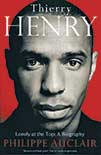 Lonely at the top:
A biography
Lonely at the top:
A biography
by Philippe Auclair
Macmillan, £17.99
Reviewed by David Stubbs
From WSC 310 December 2012
“I don’t recognise myself in the players I see today,” George Best said in his very last interview, conducted, as it happens, with Philippe Auclair himself. “There’s only one who excites me, and that is Thierry Henry. He’s not just a great footballer, he’s a showman, an entertainer.”
Henry, however, is not exactly in the Best tradition. He has both more and less about him than the ultimately ruined Manchester United superstar. Henry’s sheer quantity, as well as quality, of achievements at both league and international level dwarf Best’s but for all that he hasn’t quite blazed in the firmament in the same way. A lifelong teetotaller, he yields little or nothing in the way of a volatile private life, while his personality ranges from affable to aloof. For all those va-va-voom ads, he is simply not as scintillating a character off the field as he was on it in his prime. Maybe that’s why there has only been one full-length study of the player published in the UK – Oliver Derbyshire’s Thierry Henry: The amazing life of the greatest footballer on earth – a book as abysmal as its title, almost Piers Morganesque in the low it sets in Arsenal-related discourse.
Auclair admits not being drawn to Henry the way he was to Eric Cantona, his pre- vious subject in the acclaimed The Man Who Would Be King. However, Lonely At The Top is probably about as shrewd and in-depth a profile as we’re likely to get of Henry, who seems to have been moulded by the drive of his father, a highly influential figure in his life until he made a botched attempt to effect a transfer for his son to Real Madrid. The book tracks his development from a speedy but slight youngster reluctant to track back to the machine of panache he was at Arsenal. Auclair adds his own flourish with allusions to the likes of Philip Larkin and Gustave Flaubert which will raise the blood temperature of the compiler of Pseuds Corner but otherwise will only distract the most determinedly Philistine reader.
Auclair poses questions he’s not always able to answer, such as why Henry never seemed to get along with Zinedine Zidane and truly fulfil his potential at international level, or why Arsène Wenger is so beset at times with tactical ineptitude despite his success at Arsenal. Viewing matters from a French perspective, he regards Henry’s fateful handball against the Republic of Ireland as an unfortunate crowning moment in his career given the probably unfair antipathy it triggered against him, though Arsenal fans in particular would hardly see this as quite so defining of the player.
The access he has had, some forbidden to UK journalists, does yield insightful, incidental nuggets along the way: into the character of Emmanuel Petit, for instance, profoundly affected by a personal tragedy; Patrick Vieira’s excessively informative quote that the cheers of the Highbury throng gave him “a hard on”; as well as the partying habits of the French squad in the 2002 World Cup. This occasionally gives the impression that, fine and thoughtful as Lonely At The Top is, its author would secretly prefer to be writing about somebody or something else.